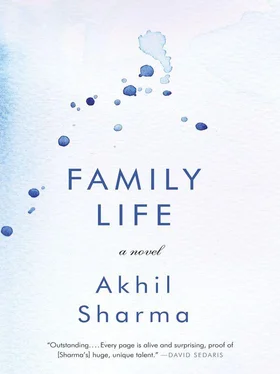Seventh grade passed and I entered eighth. It was now normal for women to come to our house and sit at the kitchen table and drink tea. Once or twice a week, whole families appeared. Usually they came after dinner. I was glad for the company, especially for those who visited at night. Often, after Birju had been fed and put back in his bed, my mother and I would sit on either side of him and my father would go upstairs to his room. Then, as my mother and I played cards, I would feel so alone that it was like we were at the bottom of an ocean.
The families that visited would talk for awhile about Birju and his health. They might discuss school or compare India and America. The problems that would lead to Indira Gandhi’s assassination were taking place and sometimes people spoke of this.
I used to like listening to people speak of India. I would get excited. It was as if a part of me had begun believing that India did not actually exist, that it was a fairy tale, and having these people speak of it confirmed that it was real.
MY FATHER’S DRINKING worsened. The disorder that had been restricted primarily to weekend mornings spread into the week. Sometimes my father was too hungover in the morning to bathe Birju. He would lie on his bed in his pajamas, one foot touching the floor to keep the room from spinning. When this happened, I took on his role in bathing my brother. Standing in the tub, holding Birju up, rubbing him with soap, feeling his flabby chest, his stretched stomach, I would be moved to tears that we were not better people, that my poor brother was in need and we were not as good as we should be.
My parents fought so much that the walls vibrated with rage. Anything could spark a shouting match: a banana peel left on the kitchen table, a garden hose left overnight on the lawn. The anger was so quick and extraordinary that it appeared disconnected from what was supposed to be the cause. This made the fights feel hallucinatory.
Adding to the sense of the fantastical were things that I saw and half failed to understand: my mother standing in the laundry room at two or three in the morning, shaking with rage as she put bed sheets smelling of urine into the machine. Another time, I noticed that there was a large rough patch on the pale blue carpet by my father’s side of the bed. Several days later, I was sitting on the school bus when I suddenly realized that my father must have vomited on the carpet.
MY MOTHER WANTED to keep the family from embarrassment, and so did I.
When we had visitors, my mother was modest. She listened without speaking. She tried to efface herself and let the guests lead the conversation. This hiding herself appeared smart because who knew what attention could lead to?
When visiting, people regularly asked to see my father. My mother would answer, with a downward glance, “He has great tiredness.” This was a strange phrase, both formal and awkward. “Unhai bahut thakan hai.” The phrase did not say that he was feeling tired but that he possessed tiredness, and with its indirection highlighted that something was being avoided and so asked the listener to not inquire further.
Usually, my mother’s request was honored. Most men and women would use formal diction and say, “With a life like yours, who wouldn’t be tired?” A few people pressed my mother. They threatened to go upstairs and bring my father down. “I won’t take no for an answer,” a woman said once. This demand to see my father was flattery. It was a way of declaring intimacy, that the woman loved us enough to make demands. This woman was, I think, a little crazy — the sort of person who loved to say the things that are uttered in movies. My mother listened to the woman and gave a quick smile to acknowledge the flattery. She remained firm, though. The melodramatic woman looked at us eagerly, wanting us to engage. When my mother did not respond, the woman had to remain silent also, and then the conversation switched on its own to something else.
While these people were in the house, I tried to be very good so that none of the positive opinion they had of us because of Birju was diminished by anything I did. To make sure we were perceived well, I would rush around the house carrying cups of tea, plates of biscuits, trying to appear sweet and helpful and trying to keep the visitors distracted from thinking about my father.
Keeping him always hidden was not possible, of course. My father didn’t take house keys to work. One evening, returning home, he rang the back doorbell while my mother was entertaining her friend Mrs. Sethi in the kitchen. My mother didn’t hear it. When he rang again and my mother let him in, he accused her of trying to teach him a lesson. “You want to humiliate me, Shuba,” he shouted. “You think you know everything and the rest of the world knows nothing.”
My mother giggled with embarrassment. Mrs. Sethi, sitting at the kitchen table, looked away. She was dark skinned and curly haired and she was a kind woman. She used to take me to the mall if I needed school supplies. “All right, Grandfather.” My mother said. “Why are you so upset?”
“Brother-in-law,” Mrs. Sethi said, standing up, “I too would get upset if I came home from working all day and couldn’t enter my house.” Among the many kind people who helped my family, Mrs. Sethi always seemed one of the more socially graceful, one of those people who do not make their life worse by getting into unneeded drama.
“See how kind she is,” my mother said to my father, reminding him to control himself before company.
My father glared at them, sweating.
MY FATHER ONLY fought with my mother, but my mother fought with me as well. She screamed at me if she caught me reading in the bathroom, which she considered a filthy habit. If I came home from school and did not immediately go say hello to Birju, she accused me of avoiding my brother. Once, when Birju was in his wheelchair and my father was feeding him, I happened to be walking past Birju and my brother coughed and some of the brown mush he was being fed landed on my fingers. I wiped my hand on the towel that lay over his chest.
“I saw that,” my mother shouted. She was standing at the stove.
“What did you see?”
“You put snot on his towel.”
“I did not. I did not!”
“I know what I saw.”
I began to have the sense that my mother disliked me, that she tolerated me in the house because it was her duty.
OCCASIONALLY THERE WERE moments of kindness in the family. On my father’s birthday, my mother prepared his favorite foods, and she fasted from morning till evening. And when my father got home, he showered and then all three of us went to the altar in my parents’ room.
Periodically on our evening walks, my mother and I would look at houses and talk about how we might change our house: paint a large rock white and place it in the center of our front lawn, get wooden squirrels and screw them to the side of the house so that they looked like they were climbing toward the roof.
I WAS ALWAYS LOST in a book, whether I was actually reading or imagining myself as a character. If bad things happened, like Birju developing pneumonia and having to wear an oxygen mask, I would think that soon I would be able to go back to my reading and then time would vanish and when I reentered the world, the difficult thing would be gone or changed.
I often lied about my reading. The books I liked were science fiction and fantasy, books where things were not as complicated and unsatisfying as real life. I claimed to have read more famous books, though — the ones our teachers told us were for older students or the ones that had been made into movies. One winter morning in ninth grade, while it was still dark outside, I sat at our kitchen table and began reading a biography of Ernest Hemingway called The Young Hemingway , hoping that if I read the biography, I could then more effectively pretend to have read him. All I knew about Hemingway was that he was famous and that he was a writer.
Читать дальше












